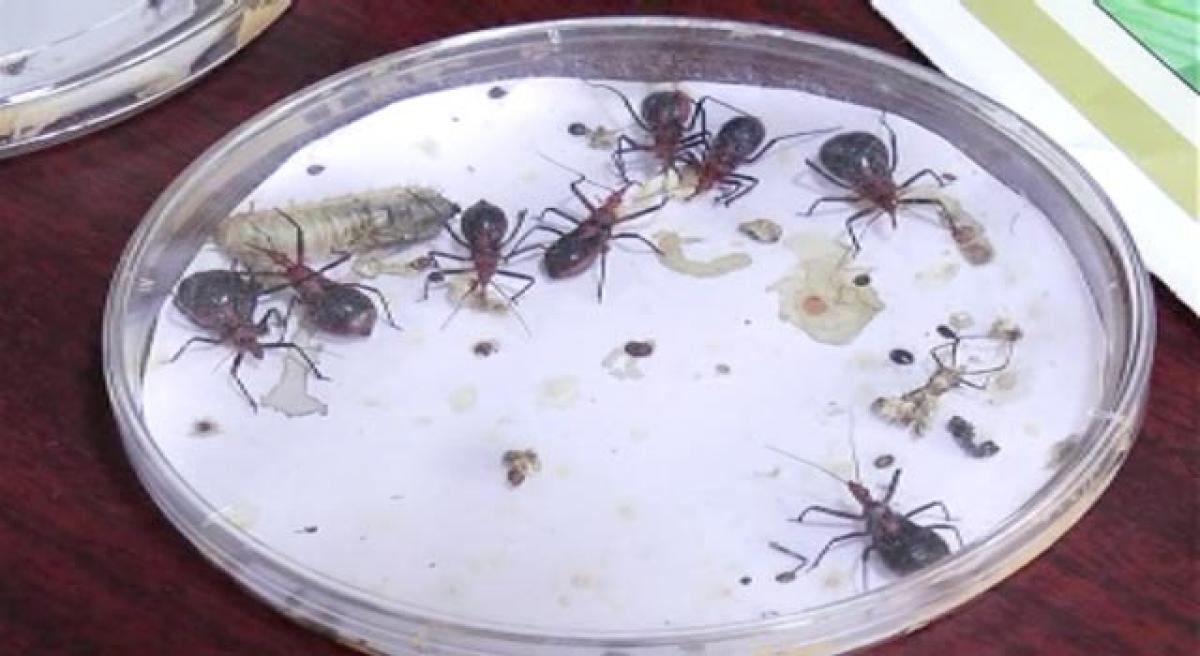Live
- Film director Ram Gopal Varma evades police questioning
- MyVoice: Views of our readers 26th November 2024
- MoU signed to implement NeVA project in AP Assembly
- Climate Change: Trump 2.0 Is Not A Fluke
- Disinformation & Disempowerment: How women’s basic rights and freedoms are being eroded all over the world
- Mahila Meekosam launched for protection of students, women
- COP 29: Rich Nations Have Their Say
- Industrial parks to be set up in every constituency
- Edu institutions to receive fee reimbursement soon
- SP orders speedy disposal of PGRS petitions
Just In

Farmers using chemical fertilizers have not only been unable to get rid of the pests, but also suffered considerable drop in yield.
Guntur: Farmers using chemical fertilizers have not only been unable to get rid of the pests, but also suffered considerable drop in yield. But a solution to solve this problem was in sight with the National Institute of Plant Health Management (NIPHM) – a central government organisation – coming to the rescue of the farmers and training them in agriculture methods without the application of chemical fertilizers and pesticides.
Today, those trained by the institute make their own bio -fertilisers and insects that are favourable to crops coupled with the advantage of reduction in input costs. They have now become role models for other farmers. According to retired government official Kukku Ashok Kumar, the NIPHM analyses farmers pitfalls and explains them the methods they should adopt to achieve good yield.
They explain how insects harmful to crops with resistance to pesticides are increasing and those beneficial to the crops dwindling. They are also trained in prepare bio-fertilisers and when to apply them to crops. The NIPHM conducts three-day residential training programmes in Telugu to groups of farmers and those interested can contact the institute’s scientists at Rajendernagar in Hyderabad.
Ashok Kumar said that he was associated with the NIPHM scientists for the past three years and worked in close coordination with them to come out with a training module to prepare the bio-fertilisers, fungicides and other concoctions to kill bacteria with practically no expenditure. Insects beneficial to crops perished because of environmental pollution caused by the reckless application of chemical fertilisers.
The farmers should multiply them. Their multiplication is possible only through natural farming methods. The institution brings these breeds from remote Agency areas like Paderu and gives them to the farmer. For instance, Nematodes function like sub-marines in gardens. We often notice Taiwan breeds of these nematodes which play havoc with guava and mango gardens.
We should bury the dead insects in the garden itself. As a result, insects friendly to the garden will spread all over the garden and kill those not beneficial to the gardens. As a result, the gardens will be free from pest attacks. Those insects friendly to the garden should be fed with the dead insects that are not friendly. Crops should be frequently rotated. Flower gardens should be developed to attract the friendly insects.
Even if those insects that are not friendly invade the garden, the insects that are friendly will kill the enemies to the crops. Spiders are considered friends to the insects that are beneficial to the crops. The objective behind the training programme is to develop the insects that are friendly to crops so that the farmer need not apply pesticides.

© 2024 Hyderabad Media House Limited/The Hans India. All rights reserved. Powered by hocalwire.com







